Filed under: Development, Environment, Featured, Interviews, Land, Repression, US
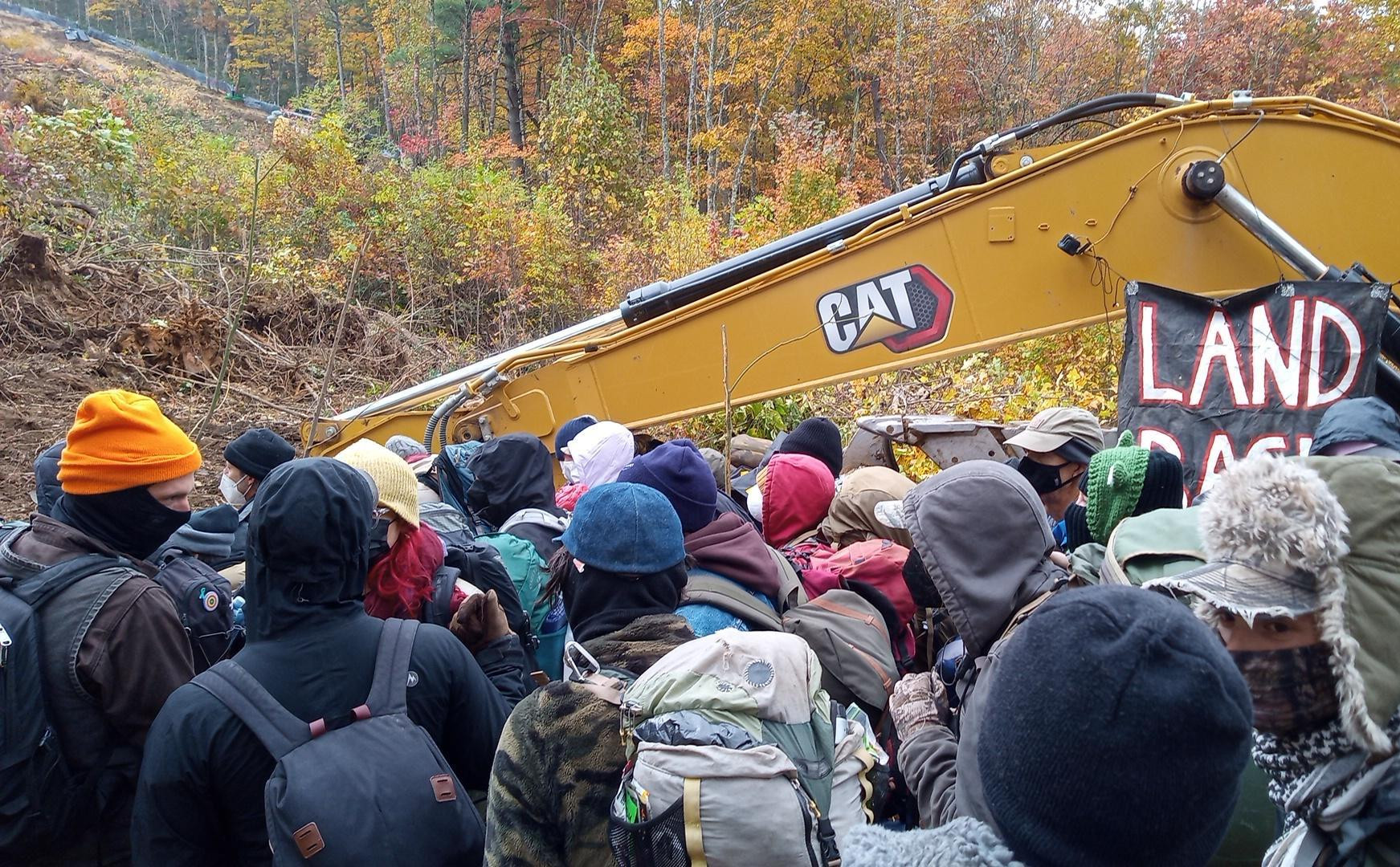
For over six years, Appalachian people have been waging a non-stop campaign of direct action to stop the construction of the Mountain Valley Pipeline (MVP), causing the project to be “six years behind schedule, [and] about half a billion dollars over budget.” Locals and their supporters are fighting the MVP for a variety of reasons: threats to their land, to stop the pollution of watersheds and eco-systems, and to block the “90 million metric tons of carbon dioxide” that will be pumped into the air over the next few decades the pipeline is expect to be operational. The corporate giants behind the MVP have amassed hundreds of violations of environmental laws and forced land owners to sell their properties in the path of the pipeline. Up until recently, the project was thought to be dead in the water, until it was resurrected by Joe Manchin, through the Fiscal Responsibility Act, and with the help the Biden administration, was fast tracked through the permit process.
But while legal avenues to stop the project have dissipated, the fight to stop the pipeline through direct action has continued full steam ahead in the hollers of Appalachia. Since 2018, It’s Going Down has spoken with folks about their fight against the MVP, and in early 2024 we reached out again to ask how the campaign has managed to continue to both take action, build community support on the ground, and also deal with a new flood of legal repression from State and corporate threats: ranging from felony charges, injunctions, and SLAPP suits.
As Prism reported:
The protests at the center of [a recent] injunction took place in July, August, and early September and involved people locking themselves to equipment or otherwise blocking construction, creating work stoppages, and preventing further damage to the land. The lawsuit claimed that these work stoppages, the longest lasting seven hours, violated the company’s property rights. Additionally, the lawsuit cited Virginia’s right-to-work law guaranteeing a workplace without “interference or threats” and a state code that prohibits picketing that impedes free entrance into “any premises.”
The lawsuit asked the judge to award compensatory and punitive damages of more than $1.3 million, as well as additional damages of $3 million levied against individual protesters and the grassroots organizations Appalachians Against Pipelines and Rising Tide North America, which facilitated bail fund donations. Activists say the pipeline is halfway complete, though the company claims construction is 94% complete and that protests are preventing the final pipe sections from going into the ground for the pipeline to be complete by early 2024.
With protesters potentially on the hook for millions of dollars, the lawsuit is the company’s most ardent escalation to stop direct actions against the project. Legal scholars are concerned that lawsuits like these are a blatant attempt to “chill” protest activity and dissent against climate harm. As Prism previously reported, fossil fuel companies, police, and state governments collaborate on legislation that effectively muzzles those who disagree with extractive projects.
What follows is a written interview with anonymous members of Appalachians Against Pipelines, conducted over email, about the campaign, why people continue to fight, and the group’s upcoming call for ‘days of action’ (January 29th – 31th) against the Mountain Valley Pipeline. For more voices on the ground fighting the MVP, check out our recent podcast interview with folks, here.
It’s Going Down (IGD): Where does the campaign against the MVP sit right now?
Appalachians Against Pipelines (AAP): In the summer of 2023, the MVP got the green light to finish all remaining construction; this includes over 1,000 water ways, Poor Mountain which was home to the Yellow Finch Treesits, and through the Jefferson National Forest, where the direct action movement against the MVP began. This means that pipeline construction has been going full force since then – there is work happening everywhere. You can’t go anywhere in the area without seeing evidence of the destruction caused by the pipeline. They are currently drilling underneath the Appalachian Trail on Peters Mountain, which is where the first treesits in 2018 happened, and is a place a lot of people in this community deeply care about.
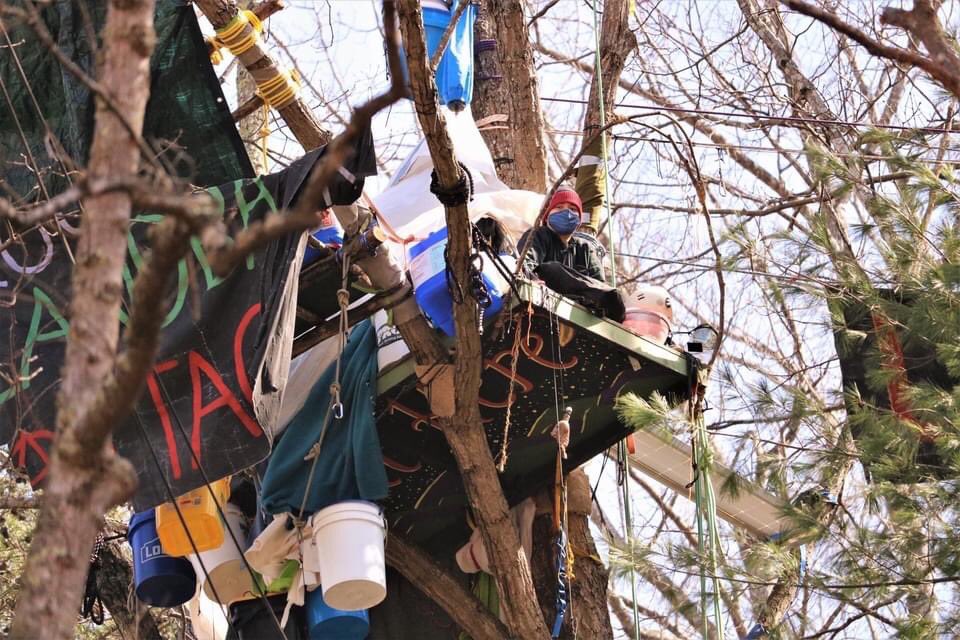
Treesitter fights the construction of the Mountain Valley Pipeline in 2021.
Since the summer, people have been throwing down to stop this newest wave of construction. When Joe Manchin and Biden leveraged an entire global socio-economic crisis to get MVP its permits in the Fiscal Responsibility Act, the new law stated that those permits and the pipeline could not be challenged in court. This means that an entire avenue of fighting the MVP through lawsuits has been erased, which really only leaves one way to stop construction: direct action. Since the summer, people have stopped work with everything from blockading access roads and construction sites to people locking themselves to drills to dance parties on the pipeline easement that caused short work stoppages. The resistance here in Appalachia is made up of people of all ages from all different backgrounds. There has been an open call for folks to come to the region since July.
“When Joe Manchin leveraged an entire global socio-economic crisis to get MVP its permits in the Fiscal Responsibility Act, the new law stated that those permits and the pipeline could not be challenged in court. This means that an entire avenue of fighting the MVP through lawsuits has been erased, which really only leaves one way to stop construction: direct action.”
Not only has resistance to the pipeline ramped up, but so has state and company repression against pipeline opponents and people who have taken direct action. The state has been using trumped up felonies and threats of serious jail time to try and scare people away from fighting the pipeline. People have been arrested, bailed out, and re-arrested on new charges.
There is a series of SLAPP suits targeting land defenders filed in West Virginia, Virginia, and in federal court. The largest of these SLAPP suits is seeking damages of over $4 million, all because people are resisting this pipeline and against what it stands for. These SLAPP suits have historically been used by corporations to punish and threaten people who have been fighting against these types of projects. They are scare tactics designed to quash dissent.
We are calling for solidarity days of action at the end of January to push back against this wave of repression. When our fights are targeted with repression and scare tactics, it’s time to ramp up resistance, fight harder, be louder.
IGD: Tell us about the upcoming call for solidarity. What’s the goal?
AAP: Appalachians Against Pipelines is calling for a wave of solidarity actions January 29th – 31st. A lot of the companies, banks, and investors behind the MVP have offices and headquarters across the country; they are not faced with the daily destruction that they are causing. AAP is calling for people across the country to bring the fight against the MVP to the doors of all those who are profiting off of this project by organizing actions in their own communities.
Obviously, our fight is much bigger than ourselves and just this pipeline. The banks that fund the MVP are the same banks that are funding the genocidal Zionist apartheid. Since October, Israel has murdered over 20,000 Palestinians, fully supported and supplied by our own government and our banks. These are also the same banks that are funding Cop City in Georgia. We are approaching one year since the police murdered Tortuguita in Atlanta during the Weelaunee forest occupation. Now, people are facing domestic terrorism and RICO charges for taking a stand against Cop City. Wherever there is violence targeting our communities, either through environmental destruction or bombs falling or police violence, there are banks and investors ensuring it all happens, profiting off the death and pain and devastation.
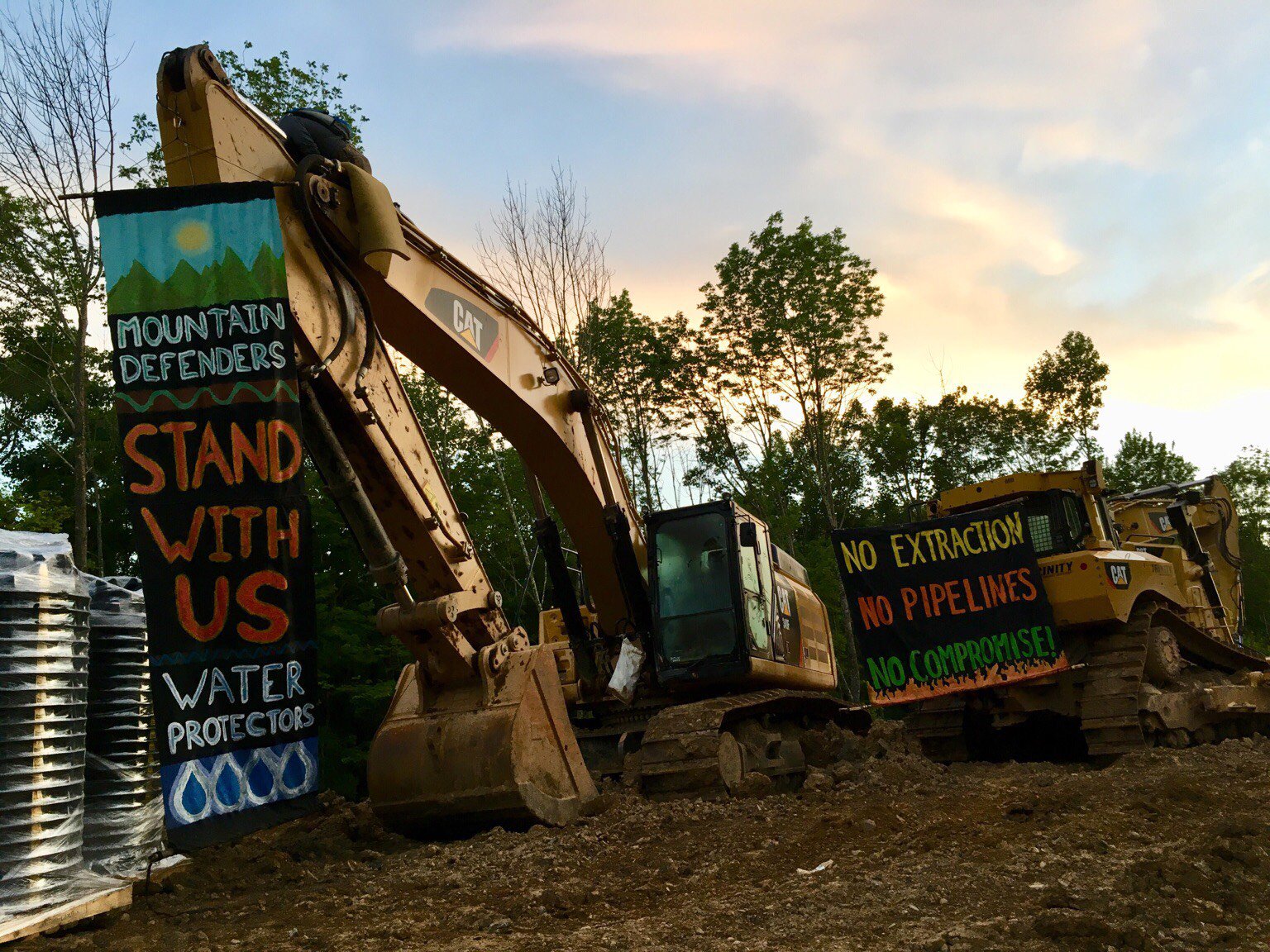
Lockdown to construction equipment in 2019.
We also want No MVP actions across the country to stand in solidarity with the No DAPL fight. People are currently facing civil RICO charges, subpoenas, and increased political repression for their ongoing resistance to DAPL. When calling for solidarity actions to fight the MVP, we hope to draw attention to these critical connections, and we want folks to connect all of these struggles when planning actions.
IGD: There’s been a lot of attempts by the company and state to attack the movement. Talk about the ongoing repression and the SLAPP suits. How have people been dealing with that?
APP: Right now, there is a wave of repression targeting the direct action movement against the MVP. This past summer, when pipeline construction first started, there was a series of community walk-ons that resulted in work stoppages. From there, the resistance to the pipeline has grown over the past months, as has retaliatory repression being thrown at people from both the state and the corporation.
At least 50 land defenders are facing SLAPP suits from the company in multiple state and federal jurisdictions. The largest of these suits is seeking damages of over $4 million from pipeline opponents. MVP (really Equitrans Midstream) is suing anybody who is putting their body on the line to stop this project, as well as people offering support to the movement. SLAPP stands for Strategic Lawsuit Against Public Participation, and they are nothing new. The treesitters at the Yellowfinch treesits (a blockade on the pipeline route that lasted an incredible 932 days) also faced SLAPP suits that were used to try and scare people off from defending some of the last remaining trees on the pipeline route. They have been used to target land defense activists and water protectors, union organizers, people fighting logging projects . . . really anyone who is standing up to corporate greed, destruction, and oppression.
“Resistance to the pipeline has grown over the past months, as has retaliatory repression being thrown at people from both the state and the corporation.”
Not only have people been facing civil litigation, we’ve also seen prosecutors and judges throw trumped up felonies at people, deny bail, set ridiculously high bails, re-arrest people at their court dates for new charges, and seek serious jail time for misdemeanor charges. Someone was recently sentenced to 3 months in jail for misdemeanor charges in Montgomery County, VA. Meanwhile, in Giles County, VA, people are facing bullshit felony abduction and theft charges for a lock down during a mass action in October. It’s important to note that this level of retaliation and repercussions has escalated compared to what this campaign has historically seen for folks taking action to stop construction over the years.
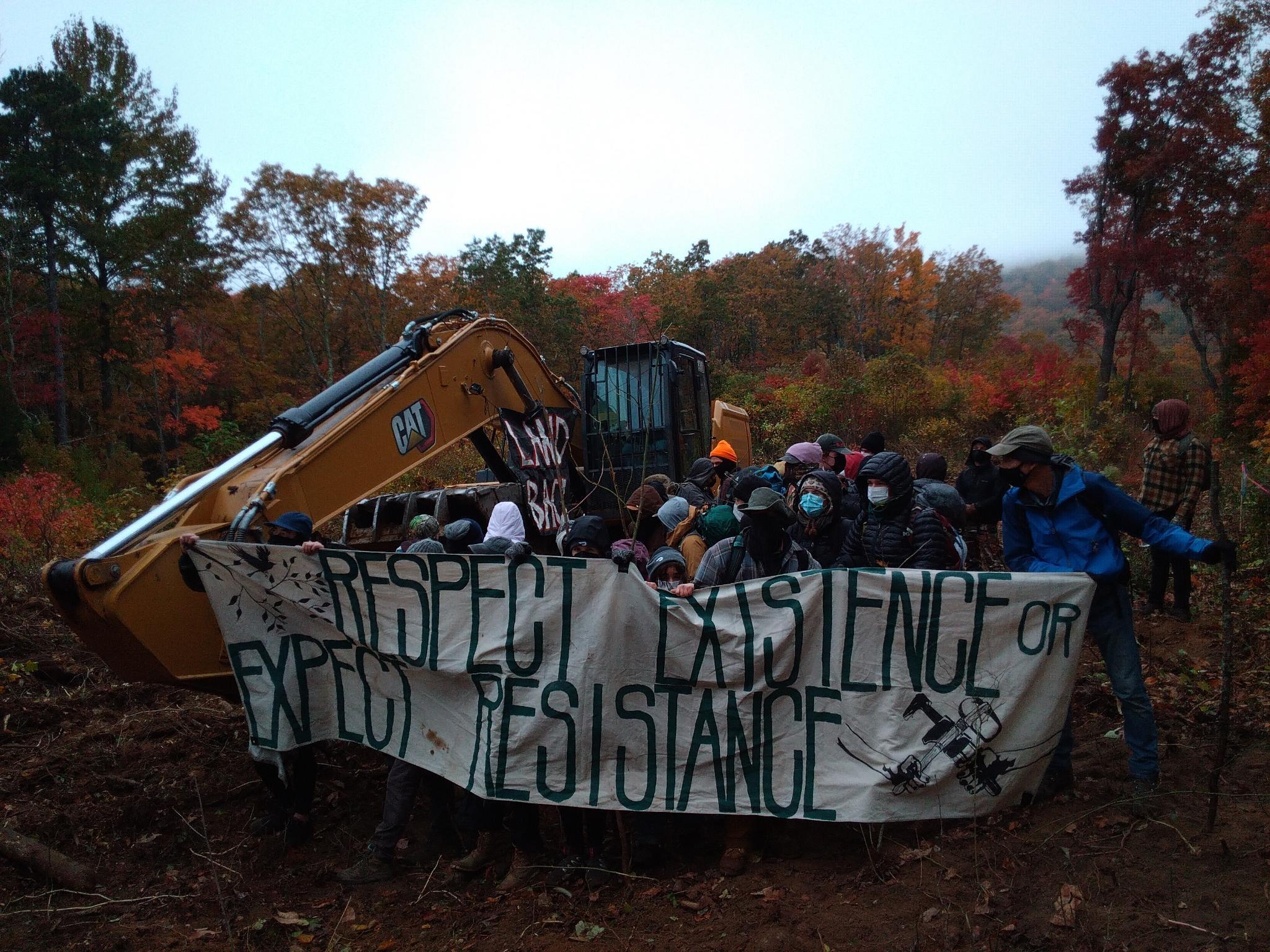
Mass action shuts down pipeline construction in early 2024.
Much of this repression is being fought in court by lawyers (if you’re able please do donate to the Appalachian Legal Defense Fund: https://bit.ly/APPLegalDefense). But a lot of how folks are dealing with this wave of repression is having each others backs in and out of the court system. And part of this call for solidarity actions is to show how the wider movement supports us. A big part of this is recognizing that when our movements are being attacked, it’s not the time to back down, but instead of fight harder, be louder, and do more. That feels tough on the ground right now. That’s why we’re asking folks to join this struggle by organizing their own actions to support.
IGD: How has the campaign sustained itself after all this time and also after facing so much resistance from the state?
APP: The direct action campaign has been going on since 2018 and the broader fight against the MVP has been going on for much longer than that, since this pipeline was first proposed. This movement has always been a mix of folks who have lived in this region their whole lives, as well as people from across the country who have come in solidarity to take action against the MVP. This means there has consistently been new energy and continuous community building in the fight. Direct action resistance here is grounded in local ties to people who are directly impacted by the pipeline, as well as the rad history of this region. Appalachia has always been a place of resistance – resistance to colonization, extraction, destruction, you name it. And this movement really draws off of the history of the movement against Mountaintop Removal in the coalfields. When your movement is based in a long line of struggles in a region, it becomes stronger and lasts longer.
“This fight is also not solely about this pipeline. It’s not solely about how many trees they cut, or streams they poison, or cubic feet of gas they will transport. It’s a fight against what the pipeline represents and for a better world. And a lot of things, like judges and lawsuits, really pale in comparison to that.”
To be honest, a large part of why this struggle continues is simply because there continues to be active pipeline construction after all these years. The original proposed end date for the MVP was 2018. Direct action tactics have effectively played a huge role in the delay overall. We’re here to stop the pipeline and want to stop it the best we can every step of the way. When you see what the companies are doing the mountains around you it’s hard to quit fighting, even with the increased state repression. This fight is also not solely about this pipeline. It’s not solely about how many trees they cut, or streams they poison, or cubic feet of gas they will transport. It’s a fight against what the pipeline represents and for a better world. And a lot of things, like judges and lawsuits, really pale in comparison to that.
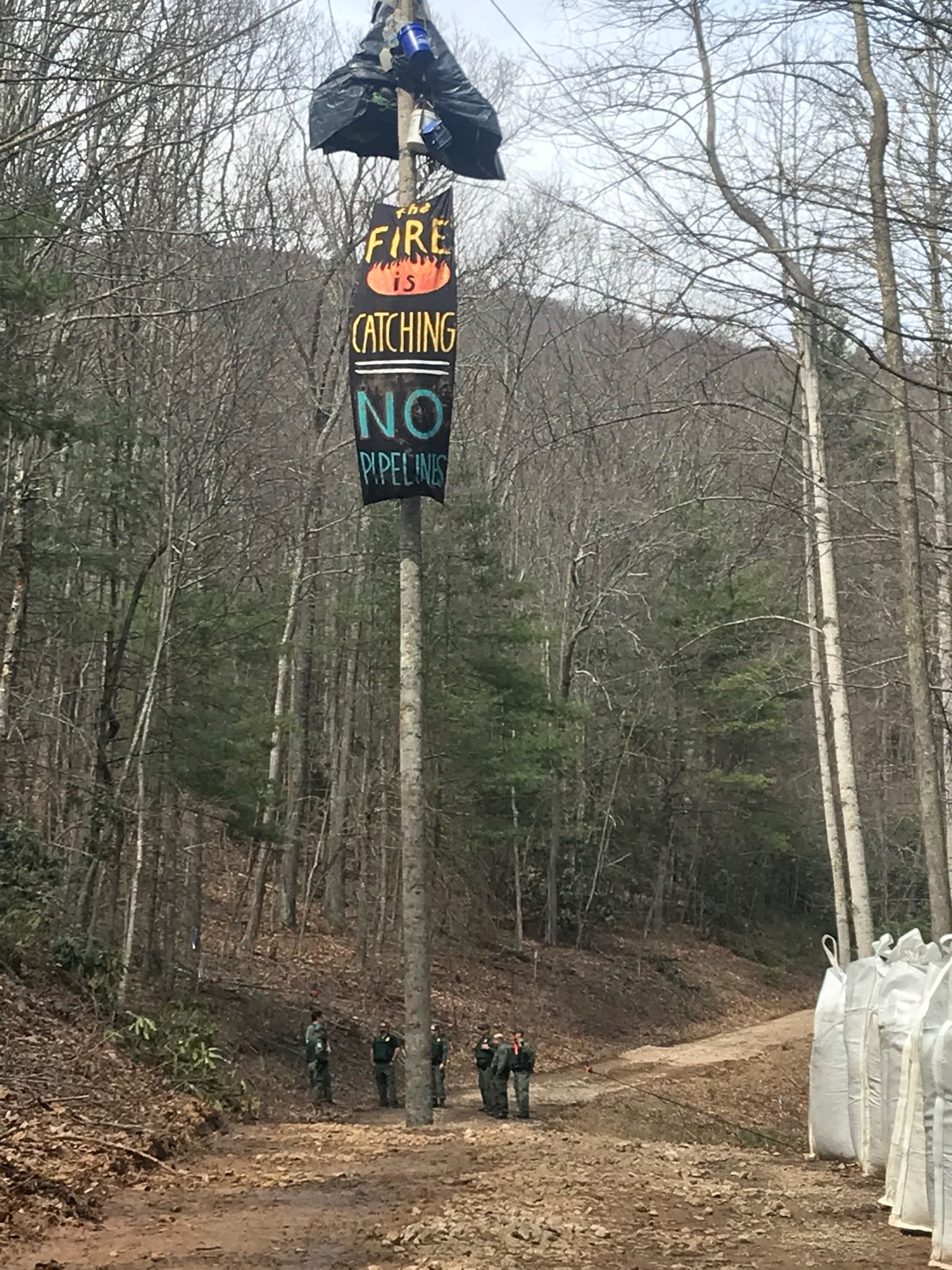
Treesit blocks the path of pipeline construction in 2018.
This movement also dedicates itself to supporting folks who take action and risk their safety and freedom when fighting the pipeline. And that focus on building relationships and making sure people have the information and legal support they need really builds trust. We are a community that always has each others’ backs in a real way – in the trees and in the courts. So many people come back time and time again to be a part of this struggle, and a large part of that is they know there is such community support behind this fight.
IGD: Where can people go to learn more about the week of action?
APP: People can check out Appalachians Against Pipelines on Facebook, Instagram, and Twitter. A lot of the information for the call for solidarity actions is on there as well as a lot of updates as to what’s been going on.
People can also check out our solidarity website that has a lot of information about secondary and tertiary targets in the fight against the MVP. You can check out maps, find targets by state, and just in general more about the who, what, and where of the companies and banks behind the pipeline. So that’s: https://bit.ly/NOMVPTARGETS
Also on our solidarity website you can find resources to help share the call to action (https://www.aapsolidarity.org/plan-solidarity-actions) and the action toolkit if you are organizing a solidarity action and want to know how to plug in to the days of action (https://www.aapsolidarity.org/sm-toolkit)





